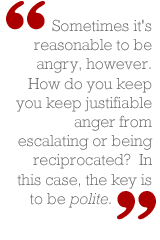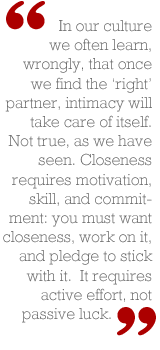










|
...and How to Fix It
Each problem pattern can be resolved, or at least reduced. An excellent text on close relationships by Sharon S. Brehm and
colleagues identifies four learnable strategies for partners who wish to make progress in preventing problems and maintaining closeness:
- Saying what you mean.
- Using active listening.
- Staying cool and polite.
- Respecting and validating each other.
Should one partner alone even bother learning skills that both partners need? One of my favorite cartoons is a vintage drawing by
Charles Addams, New Yorker illustrator and inventor of the grim characters of the 1960s "Addams Family" TV show. As a marriage
counselor wordlessly opens his door to the waiting room, an irate, bulky woman barks at her henpecked husband, who has just begun to
rise from his seat, "You stay here. I'll talk to him."
True, she'll do no good. The power disparity in that marriage is only worsened by her determination to dominate "couples" therapy. But
in real-life, non-cartoon life, it can't hurt and can certainly help if at least one partner has a plan for staying together. As you
review these maintenance strategies, remember that even if you try these "unilaterally," not unlike a one-side peace initiative, it's
not wasted effort. Every effort you make just could help your relationship and provide a "model" for your partner. As the other
person sees and hears you trying new behaviors, not only will his or her responses need to change, but it will be clear that new behaviors
are possible -- because after all, you're doing it!
Saying What You Mean
When offering complaint or criticism, it only makes things worse to blame the other person's character: "You are so lazy!" More
accurate and helpful is a behavior description, such as, "You left wet towels on the bathroom floor again." This focuses the
discussion on small, correctable problems rather than broad accusations or long-standing habits. Keep your description precise
and concrete-"towels" and "wet," rather than "mess." Finally, avoid generalizations like "always" and "never": "You always do
this! You never help around here!" Such broadsides are not only inaccurate and biased, they are also demoralizing. Imagine
hearing such a criticism leveled at you: if you truly "never" do something right, then making a small effort now feels pointless.
To speak more accurately, stick to what you know: you don't know your partner's intentions, but you do know how you feel. Instead of
"You deliberately humiliated me in front of my mother!," say, "I felt humiliated when you said that in front of my mother."
From a practical perspective, you-statements invite contradiction, but I-statements do not. If you say, "You meant to hurt me," the
other person can retort, "I did not!" But if you say, "I felt hurt," your partner can hardly argue, "You did not feel hurt." Right or
wrong, your feelings are your feelings. By sticking to what you feel and know, you stay focused, avoid accusations, and give your
partner something to respond to: "You felt hurt? I didn't mean to hurt you. I'm sorry. I'll try not to do that again."
You can combine behavior descriptions with I-statements by making XYZ statements: "When you do X in situation Y, I feel Z":
- "When you mention my diet in front of my friends, I feel self-conscious."
- "When you leave wet towels on the floor for me to find, I feel taken advantage of."
- "When I ask you for help but instead you tell me what I did wrong, I feel scolded, not helped."
Using Active Listening
You might recognize active listening as a technique used by some therapists. It has been mocked by comedians and can sound false and distancing: "I hear you saying you are unhappy with me" or "I sense
your displeasure at my criticism." But it is possible to listen actively without using "thera-speak." If you make a statement your
partner reacts badly to, try paraphrasing it:
You: "I finished folding the laundry you left on the bed."
Partner: "That's not fair! I got stuck out here when the phone rang. I didn't leave it for you to do!"
You: (paraphrasing): "I wasn't criticizing. I just saw that you were busy, and I wanted to help you out."
Partner: Oh. Thanks."
Another active listening skill is perception checking. This is the opposite of mindreading. In mindreading, you assume you know
the other's intentions. But in perception checking, you admit you don't know and want to understand correctly. Instead of saying,
"There you go, blaming me for being late to the party!" check your perceptions: "It seems like you're blaming me for the delay. Is that
what you meant?" By checking with your partner, you show how things look to you, and give your partner the chance to correct wrong
impressions.
Paraphrasing and perception checking are active efforts to listen carefully. Even if you don't defuse every conflict, by
consistently using these techniques, you show your partner that you are paying attention and trying to understand. Such motives count for
a lot when people are close.
Remaining Cool and Polite
In composing these examples, I find myself using lots of exclamation points to punctuate emotional dialogue. "You really hurt
my feelings" is more intense and provocative with this punctuation: "You really hurt my feelings!" Behind that line-and-dot notation is
emotion -- joy, aggravation or despair. Obviously, a major challenge in reducing conflict is staying calm. Have you ever raised your voice
to be heard over a loud TV or radio, only to be told, "Don't yell at me!"?
Loud anger provokes more of the same, in heated escalation. John Gottman calls this negative affect reciprocity (NAR), the
exchange of bad feeling between arguing partners. In unhappy couples, NAR is frequent: scorn, sarcasm, and impatience color many or most of
their interactions. Such exchanges are aversive even if you enjoy a good debate. For one thing, a debate can quickly escalate into a
fight. Further, when interactions are unpleasant, we avoid them. Soon you might cease talking to each other at all. And when communication
stops, intimacy dies.
To reduce NAR, first, remain calm. Try even simple breathing exercises; count from one to ten! Remind yourself that many slights
or hurts are "nothing personal," even if they feel that way to you. When your partner says, "Stop nagging, I'll get to it," it may
not mean "You're a nag!" but simply, "Okay, stop reminding me. I will do it later." Telling yourself "It's nothing personal" can
help you to feel better and move along.
Sometimes it's reasonable to be angry, however. How do you keep justifiable anger from escalating or being reciprocated? In this
case, the key is to be polite -- no scholarly jargon, just the effort of civil speech and action. "Let's not talk about this now" or
"I'm angry now so I might say something I don't mean" can help keep perspective and prevent a blowup. Commenting on communication itself,
noting that "That was a sarcastic statement" or "I said that more angrily than I meant to" involves metacommunication.
Metacommunication is communication about communication. This is often helpful, it reminds both parties that their words have
power. By listening not only to words but to tone of voice and volume, your own and your partner's, you become sensitive to when
it's time to stop, calm down, and reschedule the discussion till you're both ready to discuss it.
Respect and Validation
In analyzing his many videotapes of conflicted couples, John Gottman identified a telltale nonverbal cue. He can tell whether a
married couple might be in serious trouble, he says, if the wife rolls her eyes at what her husband says. The simple facial expression
indicates disrespect, and once she has lost respect for her husband, their intimacy is doomed. Oddly, it doesn't seem to matter
if the husband rolls his eyes at what his wife says! Perhaps it is a given that in many traditional marriages, it is not
expected that the husband will "respect" the wife. But respect in the reverse direction is part of the glue that keeps the partners
together.
In true partnerships -- relationships between peers, "on a par" -- mutual respect is essential for continued love and closeness. Respect
cannot merely be felt, it must be expressed, and nurtured. Even if you disagree with your partner, you can express your position
respectfully.
Disrespectful
Ralph: "Alice, I am the man in this family and what I say goes!"
Alice: "Yeah, right. You are such an idiot."
Respectful
Chandler: "I made a decision and I want you to back me up!"
Monica: "I don't think it was the right decision. But I want you to be happy and I'll work with you.
The central part of expressing respect is validating the other's position. This is not the same as agreement. You're just
acknowledging that your partner has a right to his or her opinions, and that you are paying attention:
| Partner: |
"I have thought a lot about the situation, and I expect you to back me up." |
| You: |
(validating but not agreeing): "I respect the thought you've put into it. You and I have
different concerns, so we don't agree. But I still respect you, you can see that, can't you?" |
Conclusion: Cherishing Closeness
In our culture we often learn, wrongly, that once we find the "right" partner, intimacy will take care of itself. Not true, as we
have seen. Closeness requires motivation, skill, and commitment: you must want closeness, work on it, and pledge to stick with it. It
requires active effort, not passive luck. Happy relationships don't "happen," they are masterpieces of art, craft, and circumstance. Not
to pretend poetry, but a garden is a decent analogy for intimacy. With the right conditions (climate, timing), you can grow a fine
garden if you want to and you do the right things. But if you don't care and you don't know what you're doing, even good conditions won't
yield lovely blooms or healthy tomatoes. Besides specific communication strategies, what can we do to "grow" intimacy?
- First, root yourself in reality. Fantasies are exciting, but when problems are real, wishing won't make them go
away. Admit to problems, recognize the signs of stress and strain, and only then can you begin to effect change.
- Second, expect change. A relationship emerges from two different individuals and develops over time. It won't stay the
same; what initially attracted you to someone may become less visible, while other qualities become prominent. It's happening in
you as well. Research shows that couples whose love is based in responding to each other-adapting to change-are more likely to
stay together over time than those who are attracted mainly by similarities. By accepting change and adapting to it, you nurture
your relationship through thick and thin.
- Third, continue the attraction that first drew you together. Remember your early dates? You'd plan something
enjoyable, try to look your best, and set aside a time when you could concentrate on each other. Which would you enjoy more:
dinner and a movie, or thoroughly cleaning the bathroom? When two people spend most of their time together in chores and difficulty,
they soon associate each other not with pleasure but with resignation. Date each other. Build in moments of
togetherness that are deliberately enjoyable, so you continue to find each other's presence rewarding and pleasurable.
- Finally, maintain your sense of humor. Humor and wit are part of the human capacity for dealing with anxiety. Using
humor does not mean making a joke of everything or dismissing someone's legitimate concerns. But if your partner criticizes you,
for example, you can show your attention and defuse anger by taking a lighter view of yourself:
Angry accusation: "What did you do with my wrench? It's not where it belongs!"
Angry Response: "I haven't seen your stupid wrench! You probably lost it."
Humorous Response: "I hope you haven't lost it. I'm the one who loses things around here. Maybe your wrench is with the last three sets of keys I lost? Here, I'll help you look."
The goal is not to be hysterical, clever or uproarious. Rather, the goal in using humor is to use slight self-deprecation, lightly
mocking yourself. You admit you have lost some things, then offer to help look for the wrench. Once when my husband and I sat down to
dinner, he said something about an annoying habit of my mother's and then, to my annoyance, said, "You're just like her." I felt somewhat
irritated but turned it into a joke. Instead of protesting, "I am not just like my mother," I leaned over, picked up his table
knife, and started cutting up my husband's dinner as if for a child -- thus "mothering" him and showing him I could be a lot more
like my mom (bless her) than I am! He got the joke and laughed, and admitted he'd been unfair.
Humor can be a great motivation for creative maintenance. Over time, couples can get into a rut and forget to express affection as
they did early in their courtship. Gentle humor -- irony or just plain silliness -- can make sweet talk less corny and initiate more
romantic closeness. Years ago I spent most of one Saturday doing a workshop downtown, so I was unable to do my share of the weekend
chores. I hurried home to find my husband was briefly out on an errand. But he'd left me a poem jotted on a scrap of paper. It had
begun as a simple note on a scrap of paper, but he added rhyme and made it into a funny Valentine:
"The lights are in the wash,
the darks are in the dryer.
My love for you, my gosh,
it sets my heart on fire."
It was playful and lighthearted, as humor should be. It was a classic "close" moment for us and I've never forgotten it. With
realism, mutual acceptance and attention to pleasure and humor, making relationships "work" can actually be more like play:
spontaneous, creative and satisfying.

|



